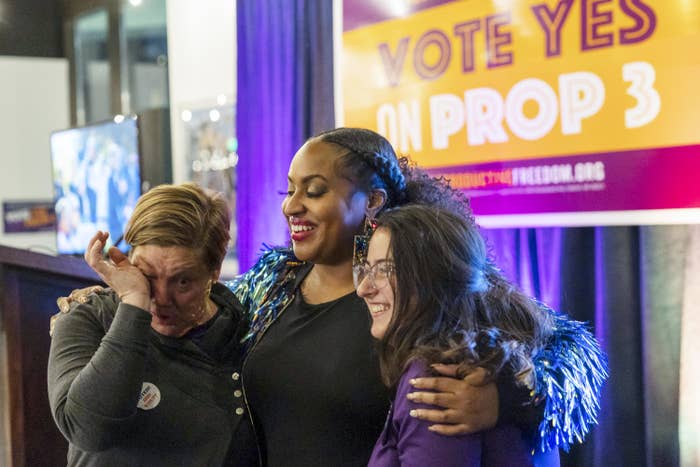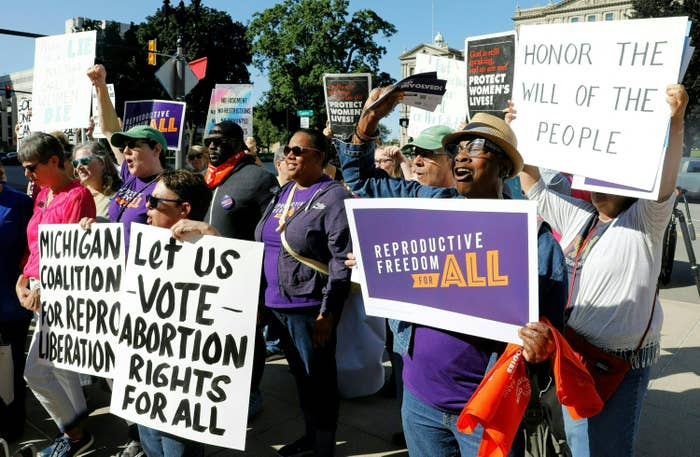
Six hours after the polls closed, at 2:06 a.m., it was finally Erik Pedersen’s turn to vote. A graduate student, he was the last person in line at the University of Michigan’s campus polling place, and his was the final ballot cast in Ann Arbor, if not the entire state.
Energized by pizza, hot chocolate, and blankets from volunteers, Pedersen, 27, stuck it out and stayed in line. At the ballot box, he voted “yes” to enshrine reproductive freedom in the Michigan Constitution. The pro–abortion rights amendment was one of the main reasons he showed up at the polls in the first place.
“I feel very strongly that the government has absolutely no right to interfere with another person's body and what said person does with it or to it,” he told BuzzFeed News.
The enthusiasm among young voters like Pedersen helped propel Proposal 3 to victory. By Wednesday, the outcome was clear: 57% of voters approved the amendment to restore the right to abortion and further protect other forms of reproductive healthcare in the state.
“I'm relieved, I’m ecstatic, I'm elated,” Julie Rowe, the campaign’s political and organizing director, told BuzzFeed News on Wednesday afternoon.
Although pundits and polls had suggested abortion would not “deliver” for Democrats, it ended up being a huge motivating issue for voters at the ballot box, both in Michigan and across the country.
Voters in Michigan reelected Gov. Gretchen Whitmer and attorney general Dana Nessel, both of whom were up against Republicans who held extreme anti-abortion stances. They also handed Democrats a majority in the Statehouse and state Senate for the first time since 1984.
Exit polls also suggested that abortion was the issue that mattered most to Michigan voters as they cast their ballots.
“I think it's very clear that abortion took center stage in the midterm elections,” said Nicole Wells Stallworth, the executive director of Planned Parenthood Advocates of Michigan. “I think that voters were certainly looking at candidates to understand whether or not they will protect their basic rights.”
What pundits were predicting was not what campaigners were hearing from people on the ground, Sommer Foster, the executive director of Michigan Voices, told BuzzFeed News.
“They think abortion is a special interest issue, but it's not,” she said.
In states where abortion was on the ballot, voters resoundingly defended abortion rights. Californians approved an amendment to explicitly defend abortion rights in their state constitution. In Vermont, where the right to abortion is already guaranteed in state law, voters further fortified their position and made “reproductive autonomy” a constitutional right. Voters in Kentucky and Montana also rejected anti-abortion ballot measures.
Michigan saw record turnout in this election, and more than 15,000 people registered and voted on Tuesday, according to Secretary of State Jocelyn Benson. President Joe Biden also praised young voters for coming out to vote in “historic numbers” in the midterms.
While volunteers recognized the enthusiasm among young voters for abortion rights, they also saw it in older people who came of age pre-Roe. Julie Falbaum, an organizer for the ACLU’s Washtenaw County office whose mother and daughter volunteered for the Proposal 3 campaign, said some of the amendment’s most passionate supporters were older women.
“They know what it is to not have their rights. And so they are the ones who are even more fierce,” Falbaum said. “Younger people understand that it’s a right they should have, but they don’t have the fear. And the older people do.”

At the end of the exhilarating, hard-won campaign, organizers said they hope their success can serve as a model for other states. But they also acknowledged that not every state allows citizens to put forward a ballot measure like Michigan was able to. (Earlier this year, Wisconsin Gov. Tony Evers proposed changing the state constitution to allow residents to bring ballot measures, with an eye toward one day getting abortion rights directly in front of voters. The Republican-led state Legislature rejected the idea.)
Even in Michigan, with Tuesday’s win for reproductive rights, there are many battles left to wage. Some Proposal 3 campaign staffers said they were taking a beat to sit in their success.
“Enshrining the right to reproductive freedom into the Michigan Constitution is a great first step,” Stallworth said. “But I think that as we move forward, it's important to think about how we make certain that we can protect everything that we have done and accomplished in these last few months on behalf of voters.”
Rowe also wanted to take time to acknowledge the campaign’s victory.
“We're going to celebrate,” she said. “Then everyone's gonna roll up their sleeves and get to work and figure out what's the next thing.”
Others who dedicated hours to the campaign looked forward to turning their attention back to parts of their lives that they had put on hold, like Falbaum, who runs a therapy practice in Ann Arbor. But even she expects she’ll continue to organize down the road.
“All of us involved in this recognize the fight is not over,” Falbaum said.
Some already had their next target in mind. At a campaign event on Tuesday night, Dianne Feeley, an 82-year-old activist with the Michigan Coalition for Reproductive Liberation, zigzagged through the crowd handing out flyers for a Next Steps Rally on Friday.
The group is planning a victory march and a discussion on what comes next, such as making Michigan a sanctuary state for abortion. “Abortion access falls far short in Michigan as it is now, and we will need to expand services further to aid people in other states who have lost access,” the flyer read.
Feeley said there is momentum to take reproductive healthcare in Michigan to the next level and then ultimately, she hopes, to free healthcare.
“We've always been talking about next steps,” she said. “It’s just the beginning of a long struggle.”
